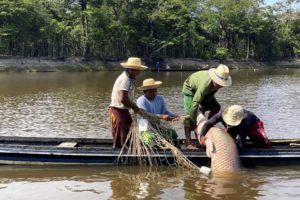(AP) – U.S. Interior Secretary Deb Haaland and other federal officials are expected Tuesday to announce steps the federal government plans to take to reconcile the troubled legacy of boarding school policies on Indigenous families and communities.
A member of New Mexico’s Laguna Pueblo and the first Native American to serve as a Cabinet secretary, Haaland is scheduled to outline a path forward while addressing members of the National Congress of American Indians during the group’s midyear conference.
Starting with the Indian Civilization Act of 1819, the U.S. enacted laws and policies to establish and support Indian boarding schools across the nation. For over 150 years, hundreds of thousands of Indigenous children were taken from their communities and forced into boarding schools that focused on assimilation.
The recent discovery of children’s remains buried at the site of what was once Canada’s largest Indigenous residential school has magnified interest in that legacy both in Canada and the United States.
In Canada, more than 150,000 First Nations children were required to attend state-funded Christian schools as part of a program to assimilate them into society. They were forced to convert to Christianity and were not allowed to speak their native languages. Many were beaten and verbally abused, and up to 6,000 are said to have died.
After reading about the unmarked graves in Canada, Haaland recounted her own family’s story in a recent opinion piece published by the Washington Post.
Past efforts by the federal government to “eradicate our culture and erase us as a people” is a history that needs to be acknowledged, she wrote.
Haaland cited statistics from the National Native American Boarding School Healing Coalition, which reported that by 1926, more than 80% of Indigenous school-age children were attending boarding schools that were run either by the federal government or religious organizations. Besides providing resources and raising awareness, the coalition has been working to compile additional research on U.S. boarding schools and deaths that many say is sorely lacking.
Experts say removing children from their families and homes has had multigenerational effects on Indigenous communities, from the loss of Native languages and cultural resources to cycles of violence and abuse.
“It is a history that we must learn from if our country is to heal from this tragic era,” Haaland wrote.
Haaland said her grandmother told her about being loaded on a train with other children from her village and being shipped off to boarding school.
“She spoke of the loneliness she endured,” Haaland recalled. “We wept together. It was an exercise in healing for her and a profound lesson for me about the resilience of our people, and even more about how important it is to reclaim what those schools tried to take from our people.”
Many of the schools were maintained by the Interior Department, which Haaland now leads.
Haaland has suggested that investments planned by the Biden administration and efforts to strengthen tribal sovereignty can help to heal the wrongs.
Copyright 2021 The Associated Press. All rights reserved.




